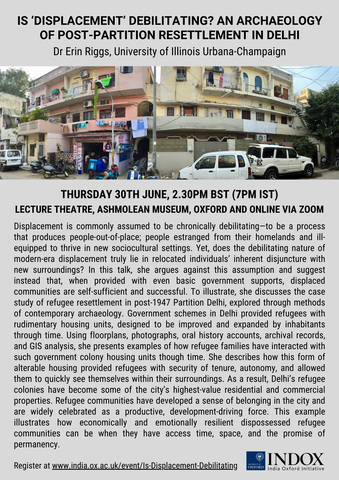Anthropology Assistant Professor, Dr Erin Riggs is giving a talk Thursday, June 30 at 2:30-4:00pm UK time (8:30-10:00am CST) titled "Is ‘Displacement’ Debilitating? An Archaeology of Post-Partition Resettlement in Delhi"
Find more info about the event here, and register here.
Abstract
Displacement is commonly assumed to be chronically debilitating—to be a process that produces people-out-of-place; people estranged from their homelands and ill-equipped to thrive in new sociocultural settings. Yet, does the debilitating nature of modern-era displacement truly lie in relocated individuals’ inherent disjuncture with new surroundings? In this talk, she argues against this assumption and suggest instead that, when provided with even basic government supports, displaced communities are self-sufficient and successful. To illustrate, she discusses the case study of refugee resettlement in post-1947 Partition Delhi, explored through methods of contemporary archaeology. Government schemes in Delhi provided refugees with rudimentary housing units, designed to be improved and expanded by inhabitants through time. Using floorplans, photographs, oral history accounts, archival records, and GIS analysis, she presents examples of how refugee families have interacted with such government colony housing units though time. She describes how this form of alterable housing provided refugees with security of tenure, autonomy, and allowed them to quickly see themselves within their surroundings. As a result, Delhi’s refugee colonies have become some of the city’s highest-value residential and commercial properties. Refugee communities have developed a sense of belonging in the city and are widely celebrated as a productive, development-driving force. This example illustrates how economically and emotionally resilient dispossessed refugee communities can be when they have access time, space, and the promise of permanency.

